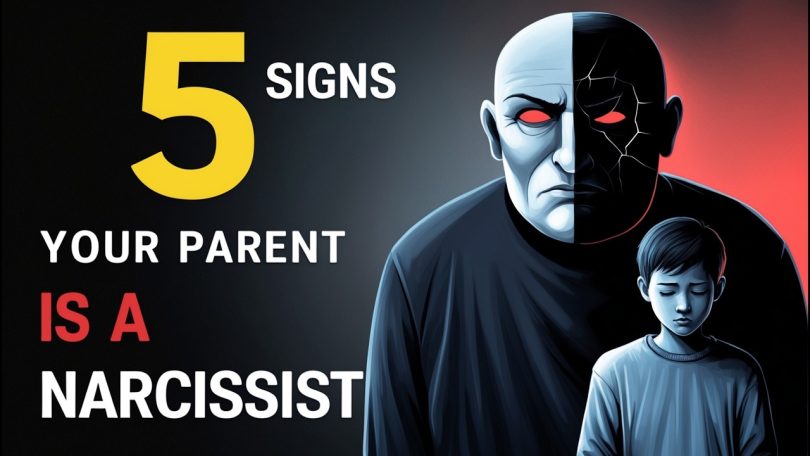What if I told you that the anxiety, the people-pleasing, and the self-doubt you struggle with daily aren’t character flaws but survival adaptations? Let’s uncover the five telltale signs that you grew up with a narcissistic parent. This article will explore the subtle yet profound signs that you may have grown up with a narcissistic parent. We’ll examine how these experiences might still be affecting your adult life, relationships, and self-perception.
Today, you’ll learn to identify specific patterns in your upbringing that weren’t just bad parenting but narcissistic behaviors. Most importantly, you’ll discover why recognizing these signs is the critical first step toward healing and reclaiming your authentic self.
Sign One: You Lived on an Emotional Roller Coaster That Wasn’t Yours
Why did you always feel like you were performing rather than simply being loved? Let’s explore what was really happening in your childhood home. Growing up, you probably noticed how your parent’s mood controlled everything, like a weather system that everyone had to adapt to. When they walked in the door after work, you immediately sensed whether it was safe to speak or if you should make yourself invisible. This wasn’t normal. In healthy families, children don’t have to constantly monitor the emotional climate.
Your achievements became something else, too. Remember that art project you were so proud of or that good grade you worked hard for? Instead of celebrating you, their response was about them: “This makes me look like such a good parent. Now the neighbors will see what a talented child I’ve raised.” Your accomplishments weren’t yours; they were props in your parent’s performance.
The cycle of praise and criticism was particularly confusing. One day, you were the smartest kid ever; the next, you heard, “Why can’t you be more like your cousin?” These dramatic swings weren’t based on anything you actually did; they reflected your parent’s internal needs in the moment. This inconsistency made it impossible for you to develop a stable sense of self-worth.
Meanwhile, your parent’s emotions always took center stage. If they had a bad day, everyone had to comfort them. If they were excited, you had to match their enthusiasm. Your feelings? They had to wait, possibly forever. You learned early that your emotional needs were secondary, if they even mattered at all.
To survive this unpredictable environment, you developed a hyper-awareness of subtle cues. You became an expert at detecting the slightest change, a barely perceptible shift in tone that signaled danger. This vigilance, which may have seemed normal to you then, was actually a sophisticated survival skill. And even now, as an adult, you might find yourself instinctively responsible for the emotions of everyone around you. When someone seems upset, you immediately think, “Was it something I did? How can I fix this?” This isn’t because you’re too sensitive; it’s because you were trained to be the emotional caretaker in relationships that should have nurtured you instead.
But here’s the truth: This constant emotional management was never your job as a child, and it doesn’t have to be your default setting now. Recognizing this pattern is the first step toward changing it.
Sign Two: You Could Never Meet the Constantly Shifting Standards
What if those high expectations were actually designed to ensure you could never measure up? This possibility might feel both disturbing and strangely validating as you reflect on your childhood experiences. When you brought home that A-minus on your math test, instead of celebration, you got that familiar look of disappointment: “Why not an A+?” they asked, as if anything less was failure. Even your proudest achievements somehow felt hollow because complete satisfaction from your parent never came.
This pattern wasn’t about motivating excellence; it was about maintaining control through perpetual dissatisfaction. The comparisons were relentless and cut deeply into your developing sense of self: “Why can’t you be more like your cousin? Your friend’s mother was just telling me how her daughter already knows three languages.” These comparisons weren’t meant as motivation; they served to keep you in a constant state of inadequacy.
In healthy families, children are appreciated for their unique qualities rather than measured against others. When you did succeed, your parent had a remarkable ability to find the single flaw in your accomplishment. You won the spelling bee, but they focused on your nervous stutter during one word. You made the basketball team, but they questioned why you weren’t made team captain. This selective attention to imperfections taught you to view yourself through a hypercritical lens that minimized your strengths.
Perhaps most disorienting was how the standards themselves would shift without warning. One day, academic achievement was paramount; the next, they criticized you for not being social enough. If you became more outgoing, suddenly your grades were slipping. The goalposts moved constantly, creating a game you couldn’t possibly win. This wasn’t coincidental; it was a strategy to maintain dominance by ensuring you remained in a perpetual state of striving and self-doubt.
The effects of these impossible standards didn’t disappear when you grew up. That perfectionism that haunts you now, the need to triple-check your work, the inability to delegate tasks because no one will do it right these are adaptive responses to growing up in an environment where mistakes carried heavy emotional penalties. Your perfectionism isn’t a character flaw; it was a survival strategy in a home where imperfection wasn’t safe.
Even today, you might notice how difficult it is to simply enjoy your successes. That promotion at work is immediately followed by worry about performing well enough. Completing a marathon becomes less about celebration and more about how you could improve your time next year. This tendency to immediately find new flaws isn’t your natural thought pattern; it’s the internalized voice of a parent who could never be satisfied.
Understanding this pattern helps explain why “good enough” feels so elusive in your adult life. The standards were never meant to be achievable; they were designed to keep you reaching, striving, and ultimately under control.
Related Topics:
10 Signs That A Narcissist Is Stalking You
HSP vs Sensitive: Difference Between Sensitive and Highly Sensitive Person
Unveiling the Enigma: Understanding Covert Narcissists
Sign Three: You Had No Personal Space or Boundaries
Why did family closeness feel more like invasion than intimacy? This question might unlock a profound realization about your childhood experience. In a healthy family, each person’s individuality is respected. But in your home, something fundamentally different was happening.
Your parent likely entered your room without knocking, read your diary without permission, or went through your backpack or phone whenever they wanted. These weren’t isolated incidents but part of a pattern where your belongings weren’t truly yours. Your parent operated as if your physical space was simply an extension of their domain because, in their mind, you were an extension of them, not a separate person with your own rights.
The emotional boundaries were equally non-existent. Your parent might have shared adult problems with you that were inappropriate for your age and development. Perhaps they discussed their marital difficulties, financial troubles, or conflicts with other family members. They might have treated you as their confidant or in an emotional supporter roles that reverse the natural parent-child relationship. This emotional adultification forced you to carry burdens that weren’t yours to bear, robbing you of the carefree aspects of childhood.
When you attempted to establish any form of privacy, your parent likely interpreted this natural developmental need as a personal rejection or evidence of suspicious behavior. “What are you hiding?” they might have demanded, or, “After all I’ve done for you, you’re keeping secrets?” This fundamental misinterpretation of normal boundary-setting as secretiveness created a painful double bind: Either surrender your developing sense of self or be labeled as disrespectful and ungrateful.
The dismissal of your independent thoughts and feelings was particularly damaging. If you expressed an opinion that differed from your parent’s worldview, you might have been met with ridicule, anger, or simply being ignored. This pattern taught you that your inner experience was valid only when it aligned with your parent’s perspective a lesson that deeply undermines the development of authentic selfhood.
These boundary violations from childhood now manifest in your adult relationships in specific ways. You might notice that you struggle to identify when someone is crossing your boundaries because those lines were never allowed to form properly in the first place. The subtle internal alarm system that should alert you to invasions of your personal space, physical, emotional, or psychological, may not function reliably because it was systematically disabled in your formative years.
The anxiety and guilt you feel when attempting to say no isn’t random or irrational; it’s the emotional echo of past experiences when boundary-setting was punished. That knot in your stomach when you need to decline a request, the compulsion to overexplain these aren’t signs of weakness but evidence of how deeply your early environment shaped your relational patterns.
Understanding this pattern helps explain why certain relationship dynamics that others navigate with ease might feel particularly challenging for you. Your difficulty isn’t a character flaw but the natural consequence of growing up in an environment where healthy boundaries weren’t modeled or permitted.
Sign Four: You Learned That Love Must Be Earned, Not Freely Given
How did you learn that love had to be earned rather than freely given? This realization might be one of the most painful aspects of your childhood experience, with effects that continue to shape your relationships today. In healthy families, a child’s worth is intrinsic; they are loved completely simply for existing. But your experience was fundamentally different.
When you failed to meet expectations, perhaps getting a lower grade than expected or forgetting a chore, you likely noticed a distinct coldness from your parent. The warm voice, the hugs, the attentive listening all disappeared, sometimes for days. This emotional withdrawal wasn’t random; it was a calculated way to control your behavior by connecting your worthiness of love to your performance. This taught you that affection wasn’t your birthright but something you had to continuously earn through achievement and compliance.
The moments when you felt most valued probably coincided with times you were useful in some way, when you won awards that made your parent look good, when you cared for younger siblings so they didn’t have to, or when you suppressed your own needs to accommodate theirs.
This conditional validation created a dangerous internal equation: Your worth as a person became tied to your utility to others. This explains why, even now, you might feel uncomfortable or anxious in situations where you’re not actively contributing or helping.
Perhaps one of the most confusing aspects was observing how differently your parent behaved around others. To neighbors, teachers, or extended family, they presented as the model parent: attentive, proud, and loving. This public persona was so convincing that you sometimes questioned your own perceptions: “Maybe I’m remembering wrong,” you might have thought, or, “Maybe I’m the problem.” This dramatic discrepancy between their public and private faces created a profound sense of cognitive dissonance and reality-questioning that may still affect your trust in your own perceptions.
The narcissistic parent doesn’t truly see their child as a separate individual with unique needs, preferences, and a distinct identity. Instead, you were treated as an extension of your parent a reflection of them, an achievement to display, or a resource to utilize. Your individual personhood, your right to develop according to your own internal compass, was subordinated to their needs and expectations. This fundamental misrecognition makes authentic connection impossible, as genuine love requires seeing and accepting another person as they truly are.
These early lessons about conditional love don’t simply disappear when you reach adulthood. You may notice that you still engage in achievement-oriented validation-seeking pursuing degrees, promotions, or other external markers of success not primarily for your own satisfaction but because they make you feel temporarily worthy of love. Or perhaps you’ve become a consummate people-pleaser, instinctively molding yourself to others’ expectations while suppressing your own needs and preferences.
Most poignantly, when someone offers you love that doesn’t seem contingent on your performance, a friend who enjoys your company even when you’re struggling, a partner who loves you on your worst days, you may find yourself waiting for the other shoe to drop. “What do they really want?” you might wonder, or, “They wouldn’t feel this way if they truly knew me.” This difficulty in accepting unconditional positive regard isn’t a character flaw but a natural adaptation to your early emotional environment, where love was a reward for performance rather than a response to your inherent worthiness.
Understanding this pattern helps explain why certain aspects of intimacy might feel foreign or frightening to you. Your difficulty isn’t a personal failing but the result of growing up in an environment where the most fundamental emotional needs were met with conditional responses rather than reliable love.
Sign Five: You Constantly Doubt Your Own Perceptions and Memories
What happens when you can’t trust your own memories and perceptions? This profound question touches on perhaps the most insidious aspect of growing up with a narcissistic parent: the systematic undermining of your reality. Remember that family vacation where your parent lost their temper and screamed at you in front of everyone? When brought up later, they might have rewritten that painful incident completely: “That never happened,” or, “I was just trying to protect you because you were misbehaving.” This wasn’t occasional forgetfulness; it was a consistent pattern of revising history to maintain their perfect image.
Sometimes, they positioned themselves as the hero: “I sacrificed everything for you.” Other times, they cast themselves as the victim: “After all I’ve done, this is how you remember things?” This deliberate rewriting of reality served a purpose: to keep you confused and questioning your own mind.
The explicit denial of your lived experience went beyond rewriting history. When you confronted them about something hurtful they said yesterday, they might have looked at you with genuine-seeming confusion: “I never said that.” This wasn’t merely disagreement about interpretation; it was outright rejection of factual events you witnessed. This pattern of denial creates profound cognitive dissonance: Either your parent is lying, which threatens your dependency on them, or your memory is fundamentally unreliable, which threatens your basic sense of reality. Most children, needing to preserve the attachment to their parent, conclude that their own perceptions must be wrong.
When you expressed natural emotional responses, such as tears after being criticized, hurt feelings when excluded, or anger when treated unfairly, your reactions were pathologized. “You’re too sensitive,” they might have said, or, “Stop being so dramatic.” This systematic invalidation of your emotional responses taught you to distrust not just your memories but your feelings as well. The message was clear: Your emotional reactions were the problem, not the behavior that triggered them. This inverted reality made you responsible for managing their harmful behavior rather than them being accountable for its impact.
Perhaps most destabilizing was how you were blamed for your natural responses to their treatment. If you withdrew after criticism, you were antisocial. If you defended yourself, you were disrespectful. If you showed signs of anxiety or depression resulting from the emotional chaos, you were making everyone miserable. Through this inverted accountability, they escaped responsibility for the effects of their behavior while simultaneously using your reactions to prove your defectiveness. This double bind made it impossible to respond correctly to mistreatment.
These early experiences created patterns that likely persist into your adult life. You might notice that you habitually second-guess yourself, even about ordinary perceptions: “Did I really hear what I think I heard? Am I remembering this correctly? Am I overreacting?” These aren’t random insecurities but the internalized echo of having your reality consistently undermined. The hypervigilance about your own perceptions reflects a childhood where trusting your senses and memory was punished rather than supported.
The habit of excessive apologizing, even when you’ve done nothing wrong, is another common aftermath. You might find yourself saying, “I’m sorry,” when someone bumps into you, when expressing a preference, or when asking for something you need. This automatic response stems from being consistently positioned as the problem in your family system. You learned that taking preemptive responsibility for potential displeasure was safer than waiting for blame to be assigned.
Understanding this pattern helps explain why you might struggle with self-trust in ways that others find difficult to comprehend. Your hesitation isn’t evidence of weakness but the natural consequence of growing up in an environment where your perceptions were systematically undermined in service of another’s psychological needs. Recognizing this dynamic is the first step toward reclaiming your right to trust your own experience of reality.




